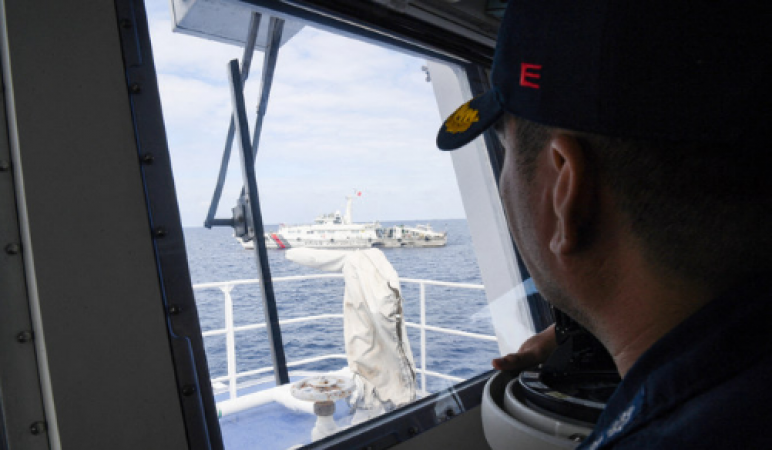
Manila: In a bold move that underscored their determination to safeguard their sovereignty and territorial claims, the Philippines recently executed a successful resupply mission to Second Thomas Shoal, a disputed atoll situated in the contentious South China Sea.
Despite relentless attempts by Chinese vessels to thwart the operation, the Philippine Navy ship persevered, delivering much-needed supplies to Filipino troops stationed on the shoal.
The Second Thomas Shoal, nestled within the Spratly Islands, has long been a point of contention between the Philippines and China. While the shoal lies well within the Philippines' exclusive economic zone, China has persistently asserted its claim to the territory.
Also Read: Mexico's Historic Path Towards Its First Female President
This dispute over the shoal is emblematic of the broader territorial disputes and rising tensions in the South China Sea, where China has been increasingly flexing its military and diplomatic muscles to solidify its claims.
The resupply mission, executed on September 9, was a clear demonstration of the Philippines' resolve in the face of mounting Chinese pressure. Spearheading the mission was the BRP Sierra Madre, a Philippine Navy ship, though its transformation is worth noting.
In 1999, it was intentionally grounded on Second Thomas Shoal and has since been converted into a fortified military outpost, serving as a tangible symbol of the Philippines' commitment to maintaining a presence in the region.
A dedicated team of around 20 sailors and marines embarked on this perilous journey, tasked with delivering a range of critical supplies to their compatriots stationed on the shoal.
These supplies encompassed food, water, ammunition, and various other essentials, ensuring the troops' continued operational capability and resilience.
The success of this mission was far from guaranteed, as Chinese Coast Guard vessels employed a barrage of tactics to obstruct the Philippine Navy ship's progress.
Also Read: World Leaders At Official Dinner, Lunch: G20 Summit: 'All-Veg' Menu—Check List
Throughout the mission, these Chinese vessels relentlessly harassed the BRP Sierra Madre, employing water cannons, aggressive maneuvers, and other intimidation tactics. Some of the Chinese Coast Guard vessels were reportedly armed with water cannons, machine guns, and rocket launchers, creating a perilous environment for the Philippine resupply mission.
Despite the intimidation and potential for escalation, the Filipino sailors and marines exhibited remarkable determination and poise, navigating their way through the challenging waters and hostile encounters to fulfill their mission objectives.
The Philippines' resolve to maintain their presence on Second Thomas Shoal has garnered international attention and support, notably from the United States.
The U.S. State Department has voiced its backing for the Philippines in the South China Sea dispute, emphasizing a commitment to uphold the rule of law in the region.
This stance underscores the broader concern within the international community over China's increasingly assertive posture in the South China Sea, where it has undertaken significant militarization efforts, including the construction of artificial islands and deployment of military assets.
However, while the successful resupply mission is a significant victory for the Philippines, it is unlikely to deter China from persistently asserting its territorial claims in the South China Sea.
The deep-rooted disputes and conflicting interests in the region are poised to remain a source of tension between the Philippines and China, with broader implications for regional stability.
The Philippines' recent resupply mission to Second Thomas Shoal represents a courageous and strategic move to protect their territorial claims in the South China Sea.
Also Read: History of World First Aid Day
In the face of persistent Chinese harassment and intimidation, the mission's success serves as a testament to the Philippines' unwavering commitment to assert their sovereignty and defend their interests in the region.
However, the larger geopolitical context suggests that this dispute is far from resolved, and it will likely continue to simmer as regional actors grapple with the complexities and implications of China's growing influence in the South China Sea.
The international community will closely monitor developments in this strategically vital area, as the tensions and challenges it presents persist on the global stage.